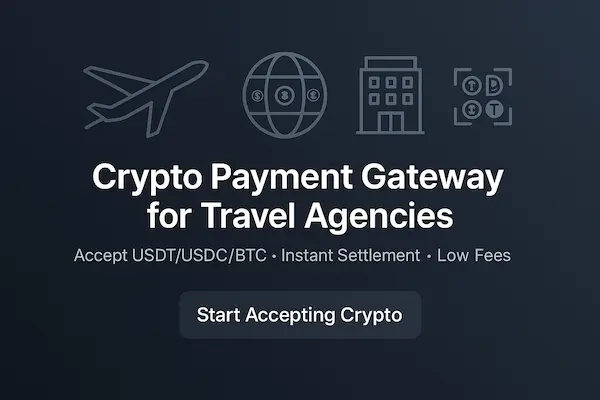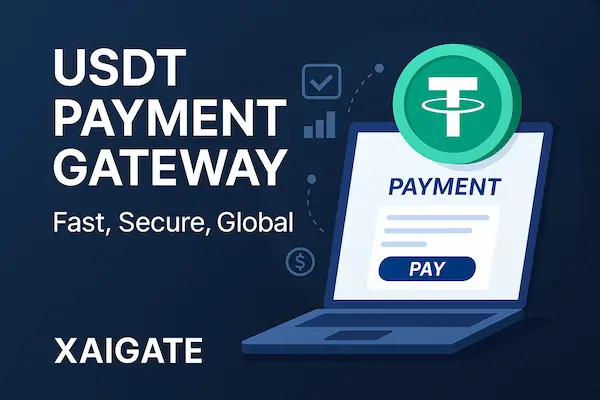Contents
- 1 1. Why Crypto Payment Gateway for Travel Agencies is Becoming Essential in 2026
- 2 2. Why the Travel Industry Needs a Crypto Payment Gateway
- 3 3. Key Benefits of Using a Crypto Payment Gateway for Travel Agencies
- 4 4. How to Accept Crypto Payments in the Travel Industry
- 5 5. Top Use Cases of Crypto Payment Gateway in the Travel Sector
- 6 6. Challenges and Compliance in Crypto Payments for Travel Agencies
- 7 7. Why XaiGate is the Best Crypto Payment Gateway for Travel Agencies in 2026
- 8 8. Future Trends: Crypto Payment Gateway for Travel Agencies in 2026 and Beyond
- 9 Conclusion – Embracing the Future of Travel with Crypto Payments
- 10 FAQs – Crypto Payment Gateway for Travel
1. Why Crypto Payment Gateway for Travel Agencies is Becoming Essential in 2026
In 2026, the travel industry is evolving faster than ever. Millions of international tourists are booking flights, hotels, and tours every day, and their expectations for faster, cheaper, and more secure payments are reshaping how businesses operate. Credit cards and bank transfers, while still widely used, are increasingly seen as outdated because of high fees, slow settlements, and cross-border limitations.
This is where the crypto payment gateway for travel plays a vital role. By enabling payments through USDT, USDC, BTC, and ETH, travel companies can provide instant booking confirmations, reduce costs, and open their doors to a new segment of global, tech-savvy travelers. For hotels, airlines, and agencies, integrating crypto is no longer optional—it’s becoming essential to remain competitive and attract a borderless customer base.
According to the UNWTO 2026 Tourism Outlook, global international arrivals are projected to exceed 1.6 billion travelers. At the same time, surveys from Statista show that over 20% of tourists prefer digital currencies for cross-border payments. Major industry players are already responding: AirBaltic accepts Bitcoin for flights, Emirates is testing crypto payment pilots, and Travala has positioned itself as the leading crypto-friendly travel agency. These developments confirm that adopting a crypto payment gateway for travel is not a passing trend but a necessary step for growth in 2026.
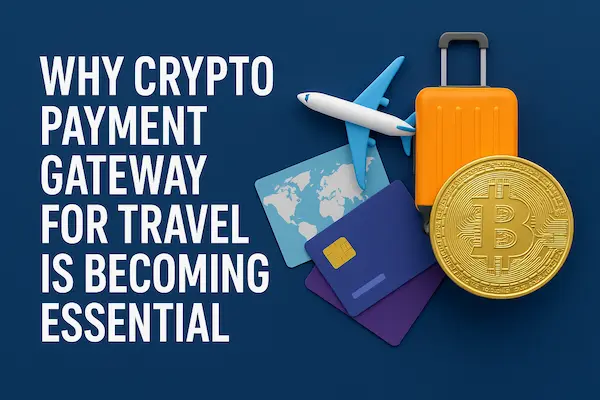
2. Why the Travel Industry Needs a Crypto Payment Gateway
Travel is one of the most international industries in the world. Every day, millions of tourists book flights, hotels, and excursions across multiple countries. Yet, the payment systems that support this activity often feel outdated and restrictive. Banks charge excessive fees for foreign transactions, settlements can take several days, and exchange rate fluctuations eat into business margins.
A crypto payment gateway for travel addresses these pain points by offering a cheaper, faster, and more transparent alternative. Instead of relying solely on traditional banking infrastructure, businesses can leverage blockchain technology to provide instant cross-border transactions, reduce costs, and improve customer trust.
1. High Fees and Hidden Costs in Traditional Payments
One of the biggest frustrations for both travelers and travel agencies is the hidden cost of payment processing. Credit card providers often charge between 3–5% per transaction, and that’s before you factor in currency conversion fees. For a luxury holiday package worth several thousand dollars, this becomes a significant overhead. Crypto eliminates most of these extra charges.
2. Instant Cross-Border Settlements with Crypto
Another major advantage is speed. While bank transfers may take two to five business days, a crypto payment gateway for travel can process settlements in minutes. This is crucial in an industry where booking confirmations and ticket issuance must happen instantly.
3. Catering to Tech-Savvy Travelers in 2026
The new generation of travelers—digital nomads, Gen Z, and Web3 enthusiasts—expect businesses to support their preferred payment methods. Just as free Wi-Fi became a standard in hotels, accepting crypto payments for travel will soon be an industry norm. By embracing this technology early, travel businesses position themselves as innovative and forward-looking.
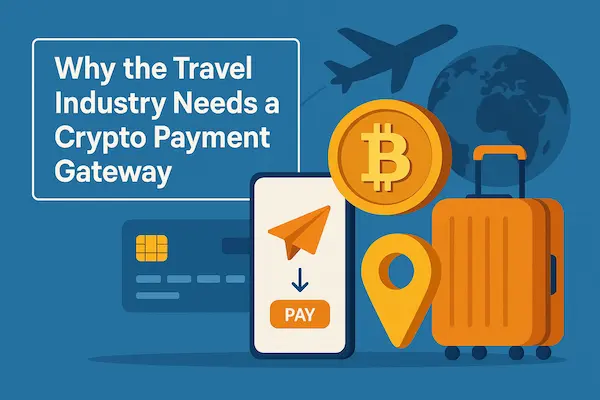
3. Key Benefits of Using a Crypto Payment Gateway for Travel Agencies
For many years, travel businesses have struggled with the limitations of traditional payment systems—high fees, delayed settlements, and limited global coverage. A crypto payment gateway for travel offers a smarter, future-ready alternative that benefits both companies and their customers. By accepting digital currencies like USDT, USDC, or BTC, agencies and hotels can cut costs, speed up operations, and build trust with international travelers.
Lower Transaction Fees
Instead of paying 3–5% per booking to credit card providers, businesses can process crypto payments at 0.2–1% flat fees. This reduction has a direct impact on profit margins, especially for high-value services like international tours or luxury hotel packages.
Faster Booking Confirmation
Travelers expect instant confirmation after making a payment. While bank transfers can take days, a crypto payment gateway allows settlements within minutes. This improves customer satisfaction and reduces booking abandonment rates.
Secure & Transparent Payments
Blockchain technology provides tamper-proof transaction records, eliminating chargeback risks and fraud attempts. Both travelers and merchants gain more confidence knowing every payment is fully traceable.
Increased Global Customer Reach
By supporting stablecoins and multiple cryptocurrencies, travel businesses can reach crypto-friendly customers in over 150 countries, without worrying about foreign exchange restrictions or currency instability.
Table 1: Traditional Payments vs Crypto Payment Gateway for Travel Agencies
| Feature | Traditional Payments | Crypto Payment Gateway for Travel |
|---|---|---|
| Transaction Fees | 3–5% + hidden FX charges | 0.2–1% flat ( XaiGate only 0.2% ) |
| Settlement Speed | 2–5 business days | Instant (minutes) |
| Security | Chargeback risks, fraud | Blockchain-secured |
| Currency Options | Limited to USD/EUR | Multi-currency + stablecoins |
| Global Reach | Restricted by banks | Borderless, crypto-native |
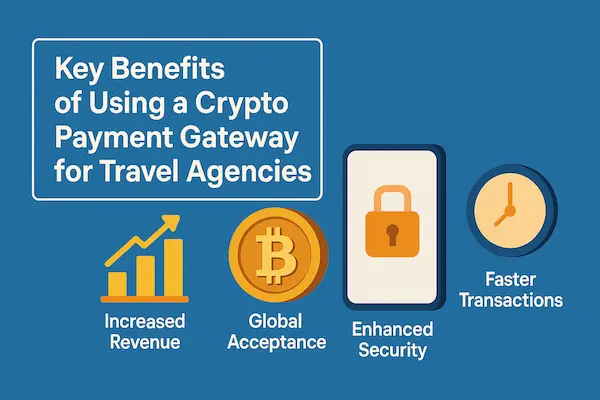
4. How to Accept Crypto Payments in the Travel Industry
Adopting a crypto payment gateway for travel may sound complex at first, but in reality, the process is straightforward. Whether you are a hotel, airline, or tour agency, integration can be done within a few steps. Once set up, businesses can provide customers with a faster, more secure, and borderless payment option that improves overall service.
Step 1 – Choose a Reliable Crypto Payment Gateway
The first step is selecting a trusted provider. Not all gateways are designed for the travel industry, so it’s important to choose one that supports stablecoins (USDT, USDC, PYUSD) and offers features tailored for global tourism. A solution like XaiGate provides low fees, multi-currency support, and easy API integration.
Step 2 – Integrate API or Plugins (for hotel/tour booking sites)
Most modern gateways offer plugins for popular booking platforms such as WordPress, WooCommerce, or custom-built travel websites. With just a few lines of code, businesses can connect their booking systems directly to a crypto checkout page, ensuring seamless payments.
Step 3 – Support Multiple Stablecoins (USDT, USDC, PYUSD, DAI)
While Bitcoin and Ethereum remain popular, volatility makes them less ideal for travel bookings. Supporting stablecoins ensures that both the merchant and customer transact at a predictable value, avoiding price swings during the booking process.
Step 4 – Set Up Automatic Fiat Conversion (Optional)
Some businesses prefer to receive payments in USD or EUR instead of holding crypto. With fiat conversion enabled, the gateway automatically exchanges crypto into traditional currency at the moment of transaction. This removes volatility risk and simplifies accounting.
Step 5 – Test and Launch Live Payments
Before going live, every travel business should run end-to-end test transactions. This ensures that bookings are confirmed instantly, refunds work correctly, and payment records are properly synced with accounting systems. Once testing is complete, businesses can switch from sandbox mode to live operations, officially offering travelers a seamless crypto checkout experience.
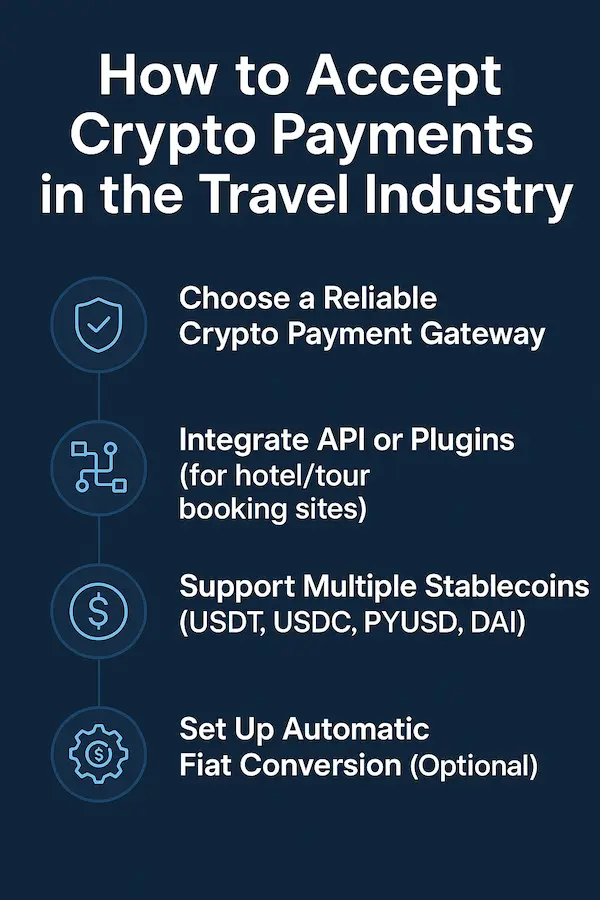
5. Top Use Cases of Crypto Payment Gateway in the Travel Sector
The adoption of a crypto payment gateway for travel is no longer theoretical—real businesses are already applying it to serve global customers. From hotels to airlines and even travel insurance providers, crypto is opening new opportunities for growth and customer satisfaction.
Case 1: Hotels and Resorts Accepting Stablecoins
Luxury resorts and boutique hotels are starting to accept USDT, USDC, and BTC for room bookings. This allows them to bypass credit card networks and save on transaction costs, while international guests avoid currency conversion fees. For travelers, paying with crypto ensures instant confirmation and peace of mind during check-in.
Case 2: Airlines Embracing Bitcoin & USDT
Several airlines have already tested crypto payments. For example, AirBaltic accepts Bitcoin for flight tickets, while other carriers like Emirates and LOT Polish Airlines are exploring similar options. By integrating a crypto payment gateway for travel, airlines can provide a smoother booking experience to global passengers, particularly those flying across multiple regions.
Case 3: Tour Agencies Offering Web3-Friendly Packages
Travel agencies such as Travala have pioneered the acceptance of cryptocurrencies for tours, accommodation, and activity bookings. Smaller agencies can follow the same path by integrating stablecoin payments, helping them stand out in a competitive market. Offering Web3-friendly travel packages is especially appealing to younger, crypto-native travelers.
Case 4: Travel Insurance and Add-On Services
Insurance providers and ancillary service providers (airport transfers, upgrades, local guides) can use crypto for micro-transactions. Instead of paying high card fees for small add-ons, customers can pay instantly with stablecoins, making upselling easier and more profitable for businesses.
Table 2: Top Crypto Payment Gateways for Travel in 2026
| Gateway | Supported Currencies | Best For | Average Fees | Key Strength |
|---|---|---|---|---|
| XaiGate | USDT, USDC, PYUSD, BTC, ETH | Hotels, airlines, agencies | 0.5–1% | Multi-stablecoin + easy API |
| Binance Pay | BTC, BNB, USDT | Crypto-native travelers | ~1% | Large ecosystem, user base |
| BitPay | BTC, BCH, ETH, USDC | General merchants | 1–2% | Long-established brand |
| Travala Pay | BTC, ETH, USDT | Travel bookings only | ~1% | Industry-specific adoption |
XaiGate stands out for travel businesses with its low fees, multi-chain support, and simple integration, making it the best crypto payment gateway for travel in 2026.
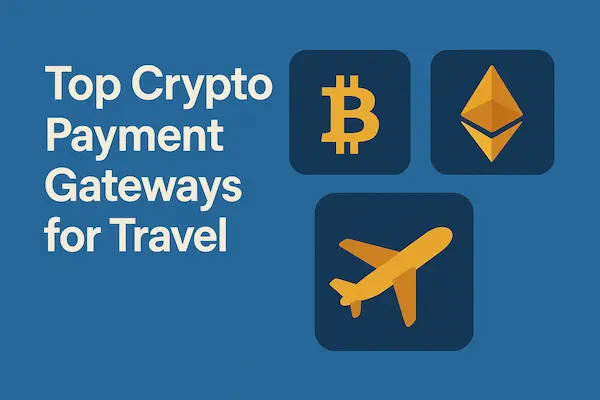
6. Challenges and Compliance in Crypto Payments for Travel Agencies
While the benefits of a crypto payment gateway for travel are clear, businesses must also be aware of the challenges. Regulations, volatility, and taxation can all impact how crypto is used in tourism. Addressing these issues early ensures smoother operations and long-term trust from customers.
KYC and AML Regulations
Most countries require payment gateways to follow Know Your Customer (KYC) and Anti-Money Laundering (AML) laws. This means hotels, airlines, and agencies using crypto must verify customer identities in certain transactions. A trusted provider like XaiGate ensures that every payment is compliant without creating unnecessary friction for the traveler.
Volatility Management (Stablecoins vs BTC/ETH)
Bitcoin and Ethereum remain popular, but their price volatility can be problematic. A booking paid in BTC today may lose value tomorrow. This is why most travel businesses prefer stablecoins like USDT, USDC, or PYUSD, which maintain stable value against the U.S. dollar. Using stablecoins allows businesses to enjoy crypto’s benefits while avoiding price swings.
Regional Restrictions and Tax Considerations
Crypto adoption is not uniform worldwide. Some regions, such as the European Union and the United States, have clear regulatory frameworks, while others are still developing policies. Businesses using a crypto payment gateway for travel must also consider how crypto transactions are taxed in their country—whether treated as income, capital gains, or VAT-inclusive payments.
7. Why XaiGate is the Best Crypto Payment Gateway for Travel Agencies in 2026
Not all gateways are built for the unique needs of the travel industry. High-volume bookings, multi-currency support, and seamless integration with online platforms demand a solution that is both reliable and forward-looking. This is where XaiGate stands out as the leading crypto payment gateway for travel in 2026.
Low Fees That Protect Margins
With transaction fees as low as 0.2%, XaiGate helps travel businesses keep more of their revenue. Compared to credit card fees of 3–5%, this represents significant savings for hotels, airlines, and tour agencies.
Multi-Chain and Stablecoin Support
XaiGate supports major stablecoins like USDT, USDC, and PYUSD, as well as Bitcoin and Ethereum. This flexibility allows travel companies to serve a wider customer base without worrying about volatility risks.
Easy Integration with Booking Platforms
Whether you operate a hotel booking website, an airline reservation system, or a tour agency portal, XaiGate offers API and plugin options for seamless integration. Businesses can go live with crypto payments in days, not weeks.
Enterprise-Grade Security and Compliance
XaiGate is built with KYC/AML compliance, fraud detection, and blockchain-level transparency, giving both businesses and travelers complete confidence in every transaction.
For travel businesses aiming to stay ahead in 2026, XaiGate is more than a payment solution—it’s a competitive advantage.
8. Future Trends: Crypto Payment Gateway for Travel Agencies in 2026 and Beyond
The travel industry is constantly evolving, and the use of a crypto payment gateway for travel Agencies is set to expand rapidly in the coming years. Beyond the current benefits of low fees and instant payments, new technologies are reshaping how travelers will book, pay, and experience their journeys.
Stablecoin Dominance in Tourism Payments
Stablecoins like USDT, USDC, and PYUSD are projected to become the preferred choice for international travel payments. Unlike Bitcoin or Ethereum, stablecoins hold a steady value, making them ideal for booking hotels, flights, and tours without volatility risks. By 2026, many travel businesses are expected to prioritize stablecoin integration as the default crypto payment method.
AI-Powered Fraud Detection for Travel Transactions
With the rise of digital bookings, fraud prevention remains critical. Leading gateways are beginning to integrate AI and machine learning tools to detect suspicious activity in real time. For travelers, this ensures safer bookings; for businesses, it minimizes the risk of fraudulent chargebacks.
NFT-Based Travel Tickets and Loyalty Rewards
The future of crypto in tourism goes beyond payments. Airlines and tour operators are experimenting with NFT tickets that double as collectibles or loyalty passes. Imagine a boarding pass stored as an NFT in your crypto wallet, or a loyalty reward that can be traded or sold. This trend could redefine customer engagement in the travel sector.
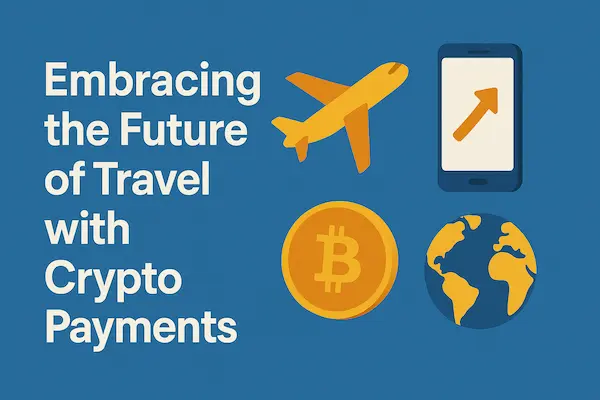
Conclusion – Embracing the Future of Travel with Crypto Payments
The travel industry in 2026 is no longer defined only by destinations—it is equally shaped by how people pay for their journeys. From airlines testing Bitcoin payments to online agencies offering stablecoin checkout, momentum is accelerating. The shift toward a crypto payment gateway for travel is not just a trend but a structural change in global tourism.
As international arrivals continue to surge, businesses that rely on outdated systems risk higher costs and lost opportunities. Those that integrate crypto payments today are positioning themselves to win tomorrow’s travelers—digital nomads, Gen Z, and a rapidly expanding Web3 community.
Quick Takeaways for Travel Businesses
| Key Point | Why It Matters in 2026 |
|---|---|
| Crypto adoption in travel is rising | Over 20% of travelers already prefer digital currencies |
| Stablecoins lead the way | USDT, USDC, PYUSD reduce volatility in bookings |
| Lower fees protect margins | 0.5–1% vs 3–5% in credit card fees |
| Faster settlement boosts trust | Instant booking confirmations improve customer loyalty |
| Compliance ensures longevity | KYC/AML-ready gateways avoid regulatory risks |
Tourism has always been about connection—bridging cultures, countries, and people. Now, it is also about bridging currencies. By adopting a crypto payment gateway for travel, businesses can reduce costs, enhance efficiency, and attract a new class of global customers who live and spend in digital assets.
XaiGate is built for this new era: low fees, multi-stablecoin support, seamless integration, and compliance by design. For hotels, airlines, and agencies that want to future-proof their operations, the choice is clear.
Adopt XaiGate today—because the future of travel payments has already begun.
For daily updates, subscribe to XAIGATE’s blog!
We may also be found on GitHub, and X (@mxaigate)! Follow us!
FAQs – Crypto Payment Gateway for Travel
1. What is a crypto payment gateway for travel?
A crypto payment gateway for travel lets hotels, airlines, and agencies accept digital currencies like USDT, USDC, or BTC with instant, low-fee transactions.
2. How do hotels accept USDT or USDC from international tourists?
Hotels integrate a crypto payment gateway, enabling tourists to pay in USDT or USDC. The system confirms bookings instantly and can convert funds to fiat.
3. Is it legal to use a crypto payment gateway for travel in 2026?
Yes. Most countries allow crypto payments if businesses comply with KYC and AML rules, making them legal for travel in 2026.
4. Which travel companies already accept crypto payments?
AirBaltic accepts Bitcoin for flights, Travala offers crypto-friendly bookings, and many hotels now support stablecoin payments.
5. Can airlines accept Bitcoin or USDT directly from passengers?
Yes. Airlines can integrate a crypto payment gateway for travel bookings, allowing passengers to pay directly in Bitcoin or USDT.
6. What are the benefits of stablecoin payments for travel businesses?
Stablecoins like USDT and USDC reduce volatility, cut fees, and allow fast global transactions, making them ideal for travel bookings.
7. Do travelers need KYC to pay for travel with crypto?
Usually no. Travelers can pay without KYC, though larger transactions may require basic verification depending on regulations.
8. How can travel agencies integrate a crypto payment gateway?
Agencies can connect through APIs, booking plugins, or custom checkout systems. Gateways like XaiGate make integration fast and simple.
9. What fees do travel businesses save with crypto payments?
Credit cards charge 3–5%, while a crypto gateway costs about 0.5–1%. This difference saves travel businesses significant money.
10. Why choose XaiGate as your crypto payment gateway for travel?
XaiGate offers low fees, stablecoin support, fast API integration, and compliance—making it the top crypto payment gateway for travel in 2026.

